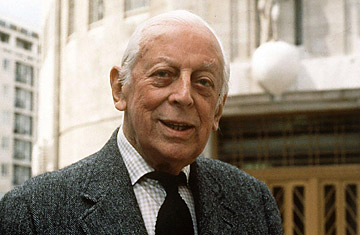
Journalist and broadcaster Alistair Cooke.
He must have been the happiest or the luckiest man alive. As a boy he felt trapped in working-class Blackpool, the Coney Island of England, and so won a scholarship to Cambridge. He loved jazz and American movies, so he got a grant to study at Yale and Harvard, and within a year the most famous person in the world, Charlie Chaplin, asked him to collaborate on a screenplay. He chafed under authority, so he got the BBC to let him do a Letter from America, in which he'd talk for 15 minutes a week on whatever he liked; that gig lasted for 58 years. What he didn't like was his drab name, Albert, so he changed it to Alistair. Alistair Cooke.
Americans of a certain age remember Cooke as the host of Masterpiece Theater from its inception in 1970 till 1992, and the writer-presenter of Alistair Cooke's America. These PBS series made Cooke, in the words of Masterpiece executive producer Rebecca Eaton, the "rock star" of educational television. On Sesame Street, a famous Muppet became "Alistair Cookie" on Monsterpiece Theater, and in Peanuts Snoopy imagined himself as "Alistair Beagle." Cooke died in 2004, at 95, and would have been 100 this past Thursday. In celebration, Masterpiece is running an hour-long biography, The Unseen Alistair Cooke, this Sunday, with reruns throughout the week. Even for those unfamiliar with Britain's genial emissary to the U.S., the show (produced and directed by Rachel Jardine) is worth TiVoing for its fond but not uncritical portrait of a man who knew everybody, remembered everything.
From his days at Cambridge, he was a man on the make. Comments from his profs indicate his charm and their nettled reluctance to surrender to it. "Well-read, quick, keen, industrious," read a judgment from 1927. "I doubt if he has any real originality." The following year: "satisfactory, but a journalist's mind." And in 1932: "I still believe that he is not really a first-class man, but there is no doubt he has an extraordinary capacity for impressing himself on others.... He is very much out for himself, and I should sum him up as a clever careerist."
On his first summer in the States, Cooke drove West, in a car he bought for $45, recording the country's vast grandeur and roadside vignettes with a movie camera he bought for $22. (Some of his road movies are included in the PBS show.) Destination: Hollywood. He had written to the Manchester Guardian saying he'd arranged interviews with top stars, and to the stars saying he was from the Guardian. Both claims were premature but prescient. He'd stay at the paper for the next 70 years, and he instantly befriended the cinemarati. One of his first film works, which he dubbed All at Sea, was of Chaplin on a yacht with his young protegee, Paulette Goddard, "as trim as shiny as a trout." The Little Tramp, like Cooke an English emigre, asked him to work on a script about Napoleon. (Later the actor-director told Cooke, "It's a beautiful idea, for somebody else," and that was that.)
Cooke's day job, as The Guardian's American correspondent, gave him carte blanche to crisscross his favorite country and send back his impressions of it. It also afforded him access to the glamorous people he'd revered watching them on a Blackpool movie screen. (In the 1950s Cooke's traveling companions were his second wife Jane and their friends, Humphrey Bogart and Lauren Bacall.) The famous somehow fell into his lap. Cooke was Greta Garbo's unofficial cigarette lighter, though he once said the most beautiful woman he'd ever met was Ava Gardner. They were charmed; he was blessed.
Cooke wasn't some pretty Euro-boy, indulged by Manhattan plutocrats because they could count on him fill out a dinner table or bridge game. He had the gift of intelligent gab, and a mind that swiftly synthesized all he'd read and seen into what he knew the listener would find informative and attractive. He demonstrated that when Edward VII resigned after marrying Wallis Simpson (another American swell Cooke had met), and NBC radio hired him to cover the event: 10 days, 400,000 words virtually all ad-libbed.
